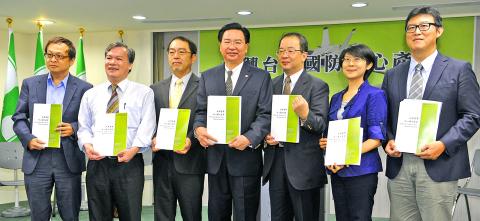The Democratic Progressive Party (DPP) yesterday made public its blue paper on national defense, vowing to push for domestically made submarines as well as next-generation warplanes if it returns to power in the 2016 presidential election.
“The DPP is determined to revive national defense,” DPP Secretary-General Joseph Wu (吳釗燮) told a news conference at the party’s headquarters yesterday morning. “Our first determination is to promote Taiwanese-built submarines and the self-production of warplanes, and our second determination is that the DPP create an open and competitive environment to promote upgrading the national defense industry.”
He said that if the DPP returns to power in 2016, it would make sure that national defense budgets would be at least 3 percent of GDP, which would be an increase of approximately NT$110 billion (US$3.61 billion) over the current average national defense budget of NT$319 billion.

Photo: George Tsorng, Taipei Times
“We would make sure that our armed forces would have the best equipment with a sufficient budget,” Wu said. “It would also help to boost the economy and create more employment opportunities.”
Chen Wen-cheng (陳文政), an assistant professor at Tamkang University’s Graduate Institute of International Affairs and Strategic Studies who also attended the press conference, supported the DPP proposal.
“Although arms purchases are often seen by top officials in the national security system as important in Taiwan’s collaboration with foreign allies, arms deals could also often become deadlocked due to political issues,” Chen said, adding that it is therefore important for the nation to have the capacity to produce its own military equipment.
Wu said that he would take the blue paper to the US-Taiwan Defense Industry Conference set to begin tomorrow in Williamsburg, Virginia, to discuss the party’s national defense policies with US officials, think tank members and Taiwanese defense officials.
“There will be no partisan division, though partisan division is normal in a democracy like Taiwan. When we are abroad, we all represent Taiwan — regardless of party affiliations,” Wu said.
The paper was the seventh of 12 blue papers the DPP plans to publish before May next year to present a full picture of the party’s national defense policy.
A source within the party said that the previous papers have been well-received among the national defense circle in the US.

Chinese spouse and influencer Guan Guan’s (關關) residency permit has been revoked for repeatedly posting pro-China videos that threaten national security, the National Immigration Agency confirmed today. Guan Guan has said many controversial statements in her videos posted to Douyin (抖音), including “the red flag will soon be painted all over Taiwan” and “Taiwan is an inseparable part of China,” and expressing hope for expedited reunification. The agency last year received multiple reports alleging that Guan Guan had advocated for armed reunification. After verifying the reports, the agency last month issued a notice requiring her to appear and explain her actions. Guan

GIVE AND TAKE: Blood demand continues to rise each year, while fewer young donors are available due to the nation’s falling birthrate, a doctor said Blood donors can redeem points earned from donations to obtain limited edition Formosan black bear travel mugs, the Kaohsiung Blood Center said yesterday, as it announced a goal of stocking 20,000 units of blood prior to the Lunar New Year. The last month of the lunar year is National Blood Donation Month, when local centers seek to stockpile blood for use during the Lunar New Year holiday. The blood demand in southern Taiwan — including Tainan and Kaohsiung, as well as Chiayi, Pingtung, Penghu and Taitung counties — is about 2,000 units per day, the center said. The donation campaign aims to boost

The Kaohsiung Tourism Bureau audited six hotels in an effort to prevent price gouging ahead of Korean band BTS’ concert tour in the city scheduled for Nov. 19, 21 and 22 this year. The bureau on Friday said that the audits — conducted in response to allegations of unfair pricing posted on social media — found no wrongdoing. These establishments included the local branches of Chateau de Chine, Hotel Nikko, My Humble House, and Grand Hai Lai, it said, adding that the Consumer Protection Commission would have penalized price gougers had the accusations been substantiated. The bureau said the Tourism Development Act

The Central Weather Administration (CWA) said a magnitude 4.9 earthquake that struck off the coast of eastern Taiwan yesterday was an independent event and part of a stress-adjustment process. The earthquake occurred at 4:47pm, with its epicenter at sea about 45.4km south of Yilan County Hall at a depth of 5.9km, the CWA said. The quake's intensity, which gauges the actual effects of a temblor, was highest in several townships in Yilan and neighboring Hualien County, where it measured 4 on Taiwan's seven-tier intensity scale, the CWA said. Lin Po-yu (林柏佑), a division chief at the CWA's Seismological Center, told a news conference